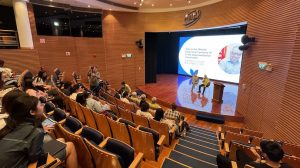A project combining academic study and community work – known as ‘service-learning’ – can be “a powerful experiential learning method” in hospitality education, says a research paper involving a scholar from IFT.
Such a project can provide students “with unique learning opportunities that are scarce in traditional classrooms,” adds the paper, looking at service-learning in hospitality-related higher education.
“Skills such as teamwork and leadership are easy to discuss in class based on theories and teachers’ explanations,” the researchers pointed out. However, it was only when students were confronted with real-life situations – such as those offered to them by service-learning – “that they can genuinely understand the issue,” the scholars noted.
The comments were featured in the paper “Experiential learning in hospitality education through a service-learning project”, produced by 4 researchers from the Asia-Pacific region, including IFT scholar Dr. Eve Ren. The work was published in the Journal of Hospitality and Tourism Education.
Service-learning – in a higher-education context – broadly refers to credit-bearing activities which are faculty-directed and involve what is known as a “teaching-learning” experience that is specific to a particular educational programme. Students participate in an organised service activity that meets identified community needs, and reflect on the activity in such a way as to gain further understanding of course content as well as an enhanced sense of civic responsibility.
Dr. Ren and her fellow researchers based the conclusions of their paper on a case study involving the 2014 intake of a service-learning course offered by the School of Hotel and Tourism Management at the Hong Kong Polytechnic University. The course – Hospitality Management and Operations in Developing Regions – sought to provide support to a newly-established 12-room guesthouse operated by a local non-governmental organisation in Phnom Penh, Cambodia. The scheme included an initial stage in Hong Kong, followed by 14 days of service delivery at the Cambodian guesthouse.
Students were divided into 4 teams. The teams were respectively in charge of marketing, food and beverage operations, front-office tasks, and housekeeping. Each group was required to propose a business plan for their assigned area, including designing a training manual and a training video. The overall goal of the scheme was to produce a comprehensive business management system for the ultimate managers of the guesthouse. The idea was that such a framework could be sustained once the students’ stint of service-delivery work was over.
‘Enhanced learning experience’
For their paper, the researchers conducted a content analysis exercise of the “reflection journals” of the 17 students from the 2014 intake who participated in the project. It was a course requirement that participating students kept such a record of their activities. The purpose was to stimulate participants to think about the overall value of the service-learning experience.
The benefits for the students were “evident”, the researchers wrote, referring to the comments featured in the participants’ journals. The scholars found that, of all learning outcomes, thoughts concerning “teamwork and leadership” generated “the highest number” of reflective comments in the journals.
The scholars highlighted that the “enhanced learning experience” was “greatly appreciated” by the students participating in the service-learning course. This included the generation of “a sense of achievement” among the students as they saw how the guesthouse benefited from the practices that they introduced. The students also profited from the “integration of learning and teaching” generated by the project. This was on the basis that the students were learning while providing training support.
“Other benefits, such as increased awareness of cultural differences and motivation for corporate social responsibility, were due to the uniqueness of the service-learning subject under study,” said the scholars.
“Service-learning is a powerful experiential learning method” that addresses the aspiration of “transforming students into global citizens,” the researchers noted.
The authors of the study, however, identified some potential issues related to effective delivery of service-learning at a higher-education level. For instance, it would be problematic to try to “control or manipulate” students’ actions in such a way that it steered them “towards the intended learning outcomes,” they noted.
“Furthermore, every service-learning course is unique but limited in scope. Thus, such programmes may only offer limited areas of learning opportunities,” the researchers concluded. “Unlike with classroom teaching, it is difficult to include every desired aspect of knowledge in the subject.”
More info
Dr. Kim Yong Hee, Associate Professor at South Korea’s Pusan National University, specialises in marketing. She holds a PhD in hospitality management from Pennsylvania State University, in the United States. Her research interests include business education, and corporate social responsibility in the services sector.
Dr. Qiu Hanqin heads the College of Tourism and Service Management of Nankai University, in Mainland China. Dr. Qiu has a PhD from the University of Strathclyde. Her research interests include inbound and outbound tourism relating to China, tourism development and policy issues in the Asia-Pacific region, and innovation in tourism education. She has published more than 80 scholarly articles in major international academic journals.
Dr. Eve Ren – also known as Ren Lianping – is an Assistant Professor at IFT. Dr. Ren holds a doctorate in hotel and tourism management from the Hong Kong Polytechnic University. Dr. Ren has taught in institutions of higher education in Mainland China and in Hong Kong. At IFT, she is the Coordinator for the Tourism Retail and Marketing Management Bachelor Degree Programme, and also oversees subjects in the field of business management. Her research interests include strategic management in hospitality, hotel development, and consumer behaviour.
Pearl M. C. Lin, Kim YongHee, Qiu Hanqin and Ren Lianping: “Experiential Learning in Hospitality Education Through a Service-Learning Project”, Journal of Hospitality and Tourism Education, Volume 29, Issue 2, pages 71-81, 2017
http://dx.doi.org/10.1080/10963758.2017.1297716









